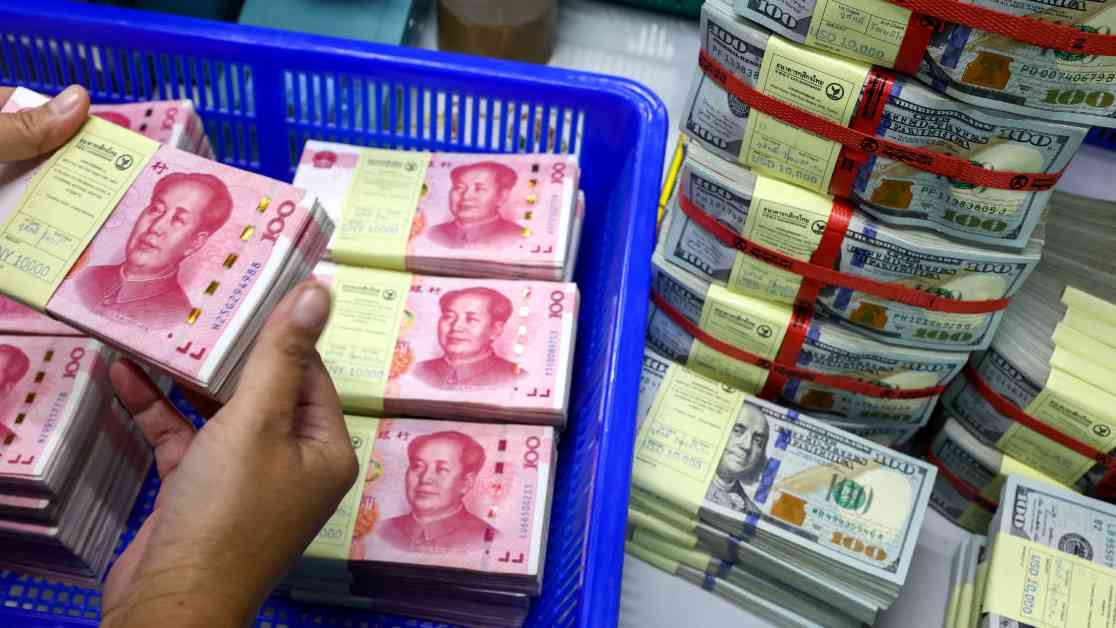U.S. and China Strengthen Financial Collaboration for Economic Stability
In a significant move towards enhancing financial stability and promoting economic growth, the United States and China recently signed agreements for cooperation in the financial sector. The collaboration was formalized during a meeting of the U.S.-China Financial Working Group held in Shanghai last week. The discussions were led by Brent Neiman, deputy under secretary for international finance at the U.S. Treasury Department, and Xuan Changneng, deputy governor of the People’s Bank of China (PBOC).
During the meeting, both sides exchanged valuable insights and information on various aspects of financial stability, including the management of financial stress and risk events. The establishment of a contact list for such situations was a key outcome of the discussions, aimed at facilitating prompt communication and coordination in times of need. Representatives from prominent financial institutions and regulatory bodies, including the Federal Reserve, U.S. Securities and Exchange Commission, National Financial Regulatory Administration, and China Securities Regulatory Commission, actively participated in the deliberations.
The official statement from the PBOC highlighted the professionalism, pragmatism, and constructive nature of the conversations between the U.S. and Chinese delegates. The topics covered ranged from capital markets and cross-border payments to monetary policy strategies, with a specific focus on the outcomes of China’s recent Third Plenum meeting. Technical experts presented detailed reports on the operational resilience of systematically important global banks, as well as stress testing scenarios related to climate risks.
In a separate development, the Chinese government bond market witnessed increased volatility earlier this month, prompting speculation about potential interventions by the PBOC. However, central bank governor Pan Gongsheng reassured stakeholders by stating that China’s financial risks have decreased, including those associated with local government debt. This announcement provided a sense of stability and confidence in the financial markets.
Furthermore, the U.S. and Chinese financial institutions convened a roundtable meeting as part of their ongoing collaboration efforts. While specific details of the participants were not disclosed, the meeting served as a platform to explore potential areas of cooperation and discuss how the finance sector could contribute to sustained economic growth. This engagement reflects the commitment of both countries to fostering mutual understanding and partnership in the financial domain.
Building Resilience in Global Financial Systems
The agreements between the U.S. and China signify a proactive approach towards strengthening the resilience of global financial systems. By sharing best practices, exchanging information, and fostering open communication channels, both countries aim to mitigate risks and uncertainties that could potentially impact the stability of the international financial landscape. The collaborative efforts between the U.S. Treasury Department and the PBOC underscore the importance of multilateral cooperation in addressing complex financial challenges.
The discussions on capital markets, cross-border payments, and monetary policy reflect the evolving dynamics of the global economy and the interconnectedness of financial markets. As the world becomes more integrated, it is imperative for major economies like the U.S. and China to work together to promote financial stability and sustainable growth. The insights gained from the working group meetings will not only benefit the two countries but also contribute to the broader objectives of global financial stability.
One of the key areas of focus during the discussions was the operational resilience of systematically important financial institutions. Given the interconnected nature of the global financial system, the robustness of these institutions is crucial in maintaining financial stability and preventing systemic risks. By conducting stress tests and risk assessments, regulators can identify vulnerabilities and implement measures to enhance the resilience of the financial sector.
Fostering Innovation and Collaboration in Finance
The collaboration between U.S. and Chinese financial institutions goes beyond regulatory frameworks and risk management strategies. It also seeks to explore innovative solutions and opportunities for cooperation that can drive economic growth and prosperity. By leveraging the expertise and resources of both countries, new avenues for collaboration in areas such as fintech, green finance, and sustainable investment can be explored.
The roundtable meeting between U.S. and Chinese financial institutions provided a platform for discussing potential areas of collaboration and identifying synergies that can benefit both economies. By sharing experiences and best practices, financial institutions can enhance their capabilities and adapt to the changing dynamics of the global financial market. This spirit of cooperation and knowledge exchange is essential for fostering innovation and driving sustainable growth in the financial sector.
The establishment of economic and financial working groups between the U.S. Treasury Department and the Chinese Ministry of Finance and PBOC reflects a long-term commitment to enhancing bilateral cooperation in the financial domain. By maintaining regular dialogues at the vice minister level, both countries can address emerging challenges, promote financial stability, and support economic development. This structured engagement framework provides a mechanism for sustained collaboration and coordination on key financial issues.
In conclusion, the agreements between the U.S. and China on financial stability represent a significant step towards strengthening collaboration and promoting economic growth. By fostering dialogue, sharing insights, and exploring new opportunities for cooperation, both countries are laying the foundation for a more resilient and interconnected global financial system. The commitment to ongoing engagement and partnership in the financial domain underscores the shared responsibility of major economies in maintaining financial stability and fostering sustainable growth.

















